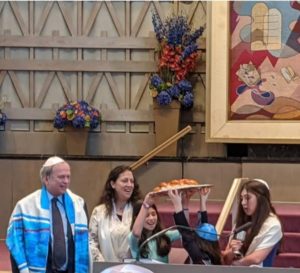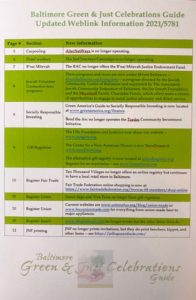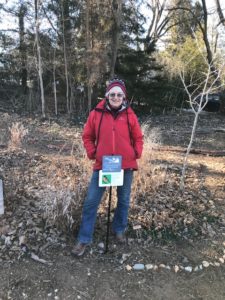
When planning their own daughter’s bat mitzvah in January of 2020, Baltimore County resident Margaret Presley-Stein and her husband, Maryland Del. Dana Stein, turned to the Baltimore Green & Just Celebrations Guide for ideas.
“Invitations were online only, and we encouraged carpooling,” said Presley-Stein, who, along with her husband, was one of the sponsors and editors of the guide when it was first released in 2012. “We also explored fair trade items and ways to avoid wasting food. We included vegetarian meals, and there were live plant centerpieces for guests to take home. Adding these components to the celebration enhanced the bat mitzvah experience for our family, and hopefully our children will appreciate how easy it is to have beautiful, fun, value-centered and ethics-mindful celebrations when they get older.”
The Baltimore Green & Just Celebrations Guide makes having environmentally friendly simchas easier. It lists resources, including ideas for food and transportation, that individuals and families in the Baltimore area can turn to in order to reduce their carbon footprint.
The Baltimore Jewish Green & Justice Alliance recently released a one-page, double-sided insert with updated information and links.
Presley-Stein likes that the guide includes both environmental and social justice elements, with Jewish values explained throughout.
“The little book incorporates every aspect of event planning, from invitations and transportation to clothing and leftovers,” she said. “It’s full of ideas and teachings and local sharings, and also is quite accessible. Find your topic, skim the section, then pick and choose, like a menu, what works for you.”
Matthew Weinstein, president of the Baltimore Jewish Green & Justice Alliance and a member of Beth Am, said that the goal is “to enable Baltimore area Jewish families to celebrate their simchas (celebrations) in ways that are consistent with Jewish values of social justice and environmental sustainability.”

The history of the guide
Over a decade ago, the Maryland Chapter of the American Jewish Congress initially released the Green & Just Celebrations Guide. The guide was the result of the work of many individuals, including Rabbi Nina Beth Cardin, who at the time spearheaded the Jewish Environmental Network. It was inspired by a similar guide published in Washington, D.C., by Jews United for Justice and drafted by Joelle Novey and Rebecca Shaloff. The goal then was to ensure that Jewish values were at the forefront
of the community’s approach to simchas.
In 2014, two years after the guide was published, the Maryland Chapter of the American Jewish Congress broke off from the national organization, emerging as the Baltimore Jewish Green & Justice Alliance, Weinstein said.
The original guide consisted of 25 pages and eight chapters. The first chapter, for example, titled, “Just Right,” encourages celebrants to think about how much food and entertainment is too much, and paraphrases the late Rabbi Mark Loeb, of Beth El Congregation, with the remark, “We are better off when our celebrations have less bar and more mitzvah!”
Subsequent chapters cover tzedakah, gifts, venues and more, with recommendations to support the Jewish community by holding celebrations at a synagogue or nonprofit and choosing venues that minimize travel.

in the Bolton Street Synagogue garden (Courtesy of Robin Kantor)
Outreach strategy
Weinstein noted that initially there were 11 congregations participating, in addition to The Associated: Jewish Federation of Baltimore and Pearlstone.
“Now we are distributing copies of the guide to additional congregations that have expressed interest in participating in the project, such as the Bolton Street Synagogue and B’nai Israel Congregation,” he said.
Weinstein pointed to individuals who are working to ensure that information in the guide is not only shared, but that its recommendations are also implemented. While the guide focuses on environmental consciousness and the just treatment of people around celebrations, environmental stewardship also extends to choosing venues that support the Jewish community and minimize the impact on the environment.
One person implementing these values is Robin Kantor, a member of Bolton Street Synagogue who currently cares for a garden at the synagogue.
“Within our first year of becoming members at Bolton Street Synagogue [in 2019], my husband and I started reclaiming an area on Bolton Street’s property that was overgrown with non-native invasive plants and was full of buried debris — concrete blocks, bricks, pipes and plastic,” she said.
Kantor’s work includes helping the congregation understand the importance of environmental stewardship.
“It is my hope that people will want to make use of the garden for simchas taking place at the shul,” Kantor said.






